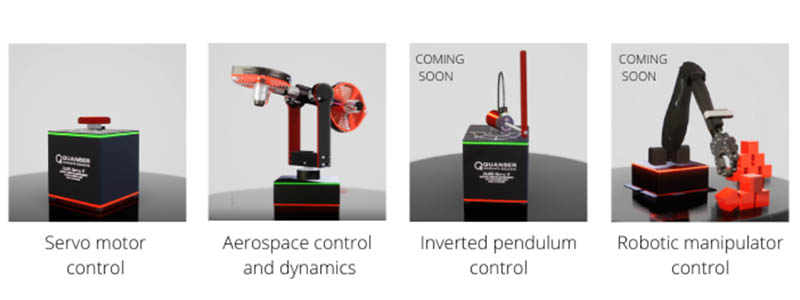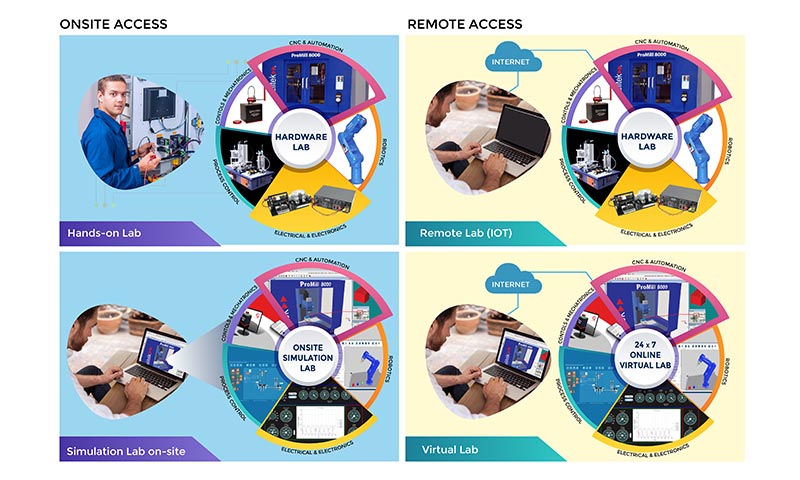Based in Dubai, EdNex is the brainchild of Senthil Kugan, a tech-entrepreneur and a visionary with an endless passion for education and innovative technology solutions for learning. A futuristic experiential learning and training consultant and solutions provider for K-12, Higher Education and Vocational & Industrial organisations, EdNex ensures that educational institutions do not have to play catch up. Adopting a consultative approach and partners, the company seeks to meet the training and learning needs of institutions with their world-class products and innovative solution. In an interaction with Higher Education Digest, Senthil Kugan talks about the importance of virtual and remote lab in technical education, solutions offered by EdNex and many more.
What has been the impact of technology on education during this pandemic?
The world currently is going through a crisis that is unprecedented due to the Covid-19 pandemic. For us, in the education sector, the challenge is humungous with the education of 300+ million students disrupted worldwide, leaving the universities and schools to deal with a situation that they were never prepared to handle.
However, thanks to the advancement in technology, today we can ensure that education continues despite wide-spread and uncertain lockdowns on educational institutions, and have positive learning experiences and outcomes, including technical education, which is so strongly dependent on hands-on learning. How to extend the traditional hands-on laboratory settings over the online virtual and remote labs remains as a major challenge.
Access to the laboratories to get hands-on experience has been a significant roadblock during the pandemic. How can we overcome this challenge faced by technical and vocational education system?
Traditionally, hands-on laboratories have been an essential part of undergraduate engineering and vocational programs. Concepts taught through lectures are often complemented with laboratory experimentations. Hands-on education allows students to experience the concepts and practising skills, conducting experiments, observing dynamic phenomena, testing hypotheses, learning from their mistakes, and reaching their own conclusions.
With the rapid progress of the controls and communication technologies like IOT, more and more lab can be conducted with Online Virtual Lab that can be reconfigured and controlled remotely. These new functionalities have been making remote hands-on training via Internet possible. New possibilities in the way lab exercises are performed include the simulation lab environment online without the license issued to students’ computers and student can accesses this lab through Virtual Lab management system of the university/vocational school. Currently, there are two approaches to conducting labs online, virtual and remote labs.
There is a lack of awareness in the educational community who either do not know many details about them or do not know them at all. What are its benefits? Which examples of virtual and remote labs for Engineering & Vocational education can be found in Virtual lab and remote and how spread and popular are they? What are the current trends and issues in the implementation and deployment of these tools? And the future ones?

What are Virtual Lab and Remote lab? Why are they important now?
The Virtual lab is based on the software Java applet, Flash, Matlab /Simulink, Labview and other software to simulate the Labs like Mechanical Engineering, Mechatronics, Electrical & Electronics, Manufacturing, Control. Virtual lab simulations are in use along with the hardware in laboratories traditionally. Now these virtual Simulations are available through cloud-based online portals, which enable the institution to allow the students to access this virtual lab without issuing a license to the students’ devices where they can access this virtual lab from the virtual lab and management portal.
Remote lab, by definition, is an experiment conducted and controlled on the lab hardware remotely through the Internet with the web interface software. The experiment conducted to use the real hardware in the lab or different location. This remote lab can be equipped with the features based on the lab requirement and safety requirement of the hardware. Students can be allowed only to collect the data, or they are allowed to control the parameters remotely. This is based on the hardware control features for the web interface. With new IoT enabled controls made the digital twins possible in the future labs, already leading educational lab manufactures like Quanser and Intelitek adopted the remote lab control and digital twins features in their lab equipment.
What are the benefits of Online Virtual and Remote labs?
Beyond the pandemic, the virtual and remote labs have great potential and need to be adopted across the universities and vocational schools. It enables the student to access the lab 24×7. Universities can adopt virtual lab along with hardware for expensive labs like CNC, CIM, Robotics, Automation and other control labs to extend the hands-on learning to the student any time.
Virtual labs allow student to repeat an experiment multiple times, giving them the opportunity to test the experiments with various parameters and outcomes. The most important benefit of a virtual lab is to let student learn from failures without causing any real damages, which is also objective of engineering education laboratories. Student can gain more skill by allowing them to work on the virtual lab without time restriction.
What are currently available options in the virtual lab for engineering and vocational education?
Most of the Mechanical, Mechatronics, Electrical & Electronics, Robotics & Control labs are currently available in popular Virtual lab portals like Learnmate and Qlab. The options include Engineering Foundation labs, Electrical and Electronics E-learning with Virtual lab, Material Testing, CNC/CAD/CAM/CIM, Pneumatics/Hydraulics/Sensor/PLC, Robotics/Vision, Control lab, Instrumentation and Process Control.

Tell us about the challenges in the implementation and deployment of a virtual lab.
In spite the virtual labs are in existence for more than a decade, the importance of online virtual lab is widely discussed during this pandemic where it became essential for universities and vocational schools to continue to deliver the technical education with standards.
The main challenge is lack of awareness and training for existing lab engineers and faculties to adopt this virtual lab as a part of their education systems. Universities and vocational Schools has to adopt the virtual lab management tools, as a part of their learning management system. The institutes need to train lab engineers and faculties on virtual lab to deliver, manage and lab assessment report.
Migration from an existing lab management tool to the online assessment tool for labs is another challenge. Institutions would need IT infrastructure and resources for deploying the cloud-based virtual lab.
As a company that creates futuristic learning experiences for the next-generation learners and professionals, what are the solutions offered by Ednex?
Being a futuristic experiential learning solution provider, we create awareness on virtual lab management platforms in partnership with leading virtual lab solution providers like Intelitek Learnmate and Quanser Qlabs. We have created a virtual lab management packages for various labs. We deliver the platform with the lab management systems to interface with the existing LMS in the institute, or they can also manage the lab with the management system provide by Ednex.
We also provide the virtual lab management certificate training for lab Engineers to get them certified in labs including Mechanical and Mechatronics, Industrial and Manufacturing Engineering, Electrical and Electronics, Instrumentation and Process Control.
What is your advice to the educational institution on building virtual labs?
There are various studies conducted about the effectiveness of virtual and physical labs, and both labs offer significant experience, skills, and knowledge. Hence, virtual labs are a great supplement to a physical lab rather than an alternative. Therefore, the focus of modern universities should be on designing hybrid laboratories and also altering the curriculum accordingly to combine the positive aspects of the physical and virtual lab to ensure that all the learning objectives of engineering laboratories are achieved in full.
About Senthil Kugan

Senthil Kugan’s unwavering commitment to improve the classroom and shaping the path in which students learn in the future has set new benchmarks in the industry. He has been instrumental in pioneering many pathbreaking initiatives such as Integrated STEM Labs, Innovation Labs, Fab Labs, Makerspaces, etc. and prestigious competitions such as the Robotics Olympiad, 3D Printing Olympiad, First Lego League, etc. Senthil has presented at many prestigious events and conducted several technical workshops in STEM, Robotics, Coding, etc. EdNex is his brainchild, founded with the vision of bringing futuristic experiential learning solutions to the new generation of learners and educators.




